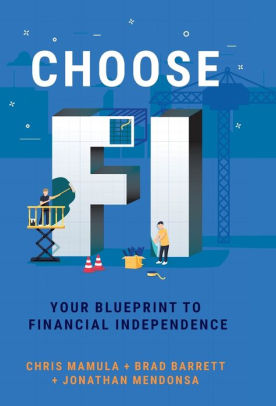Taking The Next Steps
The path to building wealth, allowing for financial independence, early retirement or any other life goals you may have, is a ridiculously simple concept.
Spend less than you earn. Invest the rest wisely. Become wealthy.
However, most people find it incredibly difficult to implement this formula into their lives and actually build wealth. Over the past few weeks, we have focused on the four things that we have found most important to get started on the right foot toward achieving financial independence and early retirement. We presented them this way for a reason.
First, continually increasing your education and improving skills is the best way to increase earning potential. Obtaining skills and knowledge in a cost-effective way addresses both increasing earning power while paying attention to the spending side of the equation by avoiding, or at least minimizing, debt incurred in the process.
Second, we view our marriage as the foundation on which everything else is built. There is certainly no rule that you couldn’t achieve financial independence or any other financial goals on your own. In fact, it may actually be easier as you don’t ever have to compromise and you can choose whatever path you want. However, if you plan to be a part of a relationship you absolutely must get on the same page with your partner. It makes no sense to invest in anything before your marriage. Otherwise, you will end up working against the one person other than yourself responsible for your success or failure. If the marriage itself fails, then 50% of your assets are immediately gone while also handicapping your future.
Third, cars are the obvious next step. First off they are a very large portion of the budget of most Americans, giving plenty of room to make improvements. Next, as reader BCB commented better than I could have said it myself: “driving and maintaining a car has the lowest (return on investment) of any activity, save smoking cigarettes or street drugs.” Additionally, most people actually finance cars, paying interest on their own financial self-destruction.
Finally, housing was covered. Since everyone needs to live somewhere, and housing is such a huge part of the budget for most households, it an obvious place to look for ways to have a drastic effect on your spending. Hopefully we effectively demonstrated some of the simple decisions that we all can make to greatly increase our savings rate by reducing the amount spent on housing, without sacrificing anything.
Are these four things the only things that really matter? If not, what are the next steps?

There are actually many other things that can have a large impact on your finances, and we plan to cover them in the future. Before we move on to the next steps, it is important to understand why we are presenting this information in the order we have. The topics above are the foundation upon which every other aspect of our early retirement plan is built. Only once you have mastered these areas does it make much sense to dive deeply into the next phases of wealth building and early retirement planning.
The biggest expense for most people, whether or not they even realize it, is taxes. For anyone choosing the path of financial independence and early retirement you can have dramatic effects on your savings rate and pay far less taxes by using simple strategies emphasizing tax deferral. The details will be spelled out in future posts. The reason we didn’t start here is simple. Using this strategy requires you to live well below your means so that you can max out tax deferred accounts. Therefore, to utilize this powerful tool, you must develop a high savings rate first.
Any recurring expenses such as food, utilities and insurance can have a huge impact on your savings rate. We didn’t include any of these in the first four steps because we feel they are all very hard to control if you haven’t first mastered the basics outlined above. Conversely, if you have mastered the above concepts they practically take care of themselves. Let’s consider a few examples.
If you are deep in debt and working 50-60 hour weeks just to cover your expenses, you would likely have little desire to come home and cook a good nutritious meal. You are much more likely to go out or buy prepared foods which are more expensive but convenient. To do otherwise would be to sacrifice even more of your valuable time, meaning it would be unlikely you would do it consistently. However, as you achieve more financial freedom in your life, you can begin to free up your time. With more time it is actually more enjoyable, healthier and cheaper to cook your own meals.
Likewise, if you have made the decision to buy an expensive, gas hogging SUV and chose to live in a location requiring you to drive an hour or more daily to work, essentially you would have tied your hands. You could use advice such as checking air pressure to improve gas mileage or shopping insurance annually to save small amounts of money. However, if you choose an inexpensive, used, gas efficient vehicle (or go car free) and live close to your work and activities you have no choice but to save on everything from the purchase price, decreased depreciation, decreased maintenance and fuel costs and decreased insurance costs automatically.
Energy costs for most people are huge. You could invest in an energy-efficient furnace or A/C unit, improved windows or insulation, etc. However, all of these things involve spending more money for a relatively small return versus simply choosing a smaller house in the first place. This decision saves much more money in energy costs with much less effort, while also likely saving on purchase price, taxes, maintenance costs, etc.
On the earnings side, making wise investing decisions can put your money to work for you. However, as with tax planning, mastering investing prior to mastering savings is virtually worthless. Imagine you could somehow develop investing skill enabling you to beat the stock market by 2% annually (making you a world-class investor) and you were starting out with $100,000 (which virtually nobody does and generally takes years to achieve). This would still earn you only an extra $2,000 in an entire year. Contrast that to the ability to increase your earning power by tens of thousands of dollars per year by increasing skills and knowledge or saving tens of thousands of dollars on your vehicles or home, which could be easily accomplished by almost anyone with the simple techniques we’ve outlined.
Think about these concepts as we begin to explore, develop and share the more advanced strategies that we are implementing now that we’ve begun to really understand early retirement planning and execution. Realize that we are on a path to financial independence by age 40 after working careers of about 15 years. We have gotten to this point while living amazing lives with minimal sacrifice. We started from humble beginnings and neither of us have ever earned a 6 figure salary. We went through the first 12 years of our careers without any investing or tax planning knowledge. The four foundation principles outlined over the past few weeks are responsible for getting us where we are today and could be followed by absolutely anyone with the will and desire to do it. By simply following our path you can get started on the right foot. By learning from our mistakes and implementing the more advanced strategies, you can do things even better, faster and much more efficiently than we have. Follow along and join us in taking the next steps!
*Thanks for reading. If you enjoyed this content, you can find my current writing at Can I Retire Yet?. Enter your email below to join our mailing list and be alerted when new content is published.

Ha! I almost spit out my coffee when I read my quote from the previous post this morning!
Another great post! I also enjoyed the Radical Personal Finance interview. I have started listening to that podcast as much as possible. He does a really great job as well!
Congratulations! You know you’ve made the big time when you get quoted on this blog;)
I am seriously glad you are enjoying the blog. Getting feedback, positive or negative, is very helpful as I try to improve my writing and learn how to build an audience. I have no plans to monetize the blog at this point so the satisfaction of knowing that I’m helping or at least entertaining someone is what keeps me going at this so thanks for the comments!